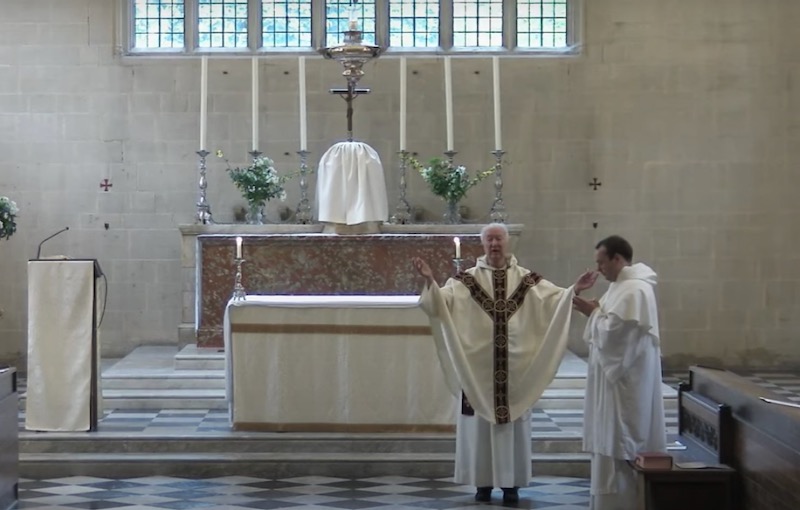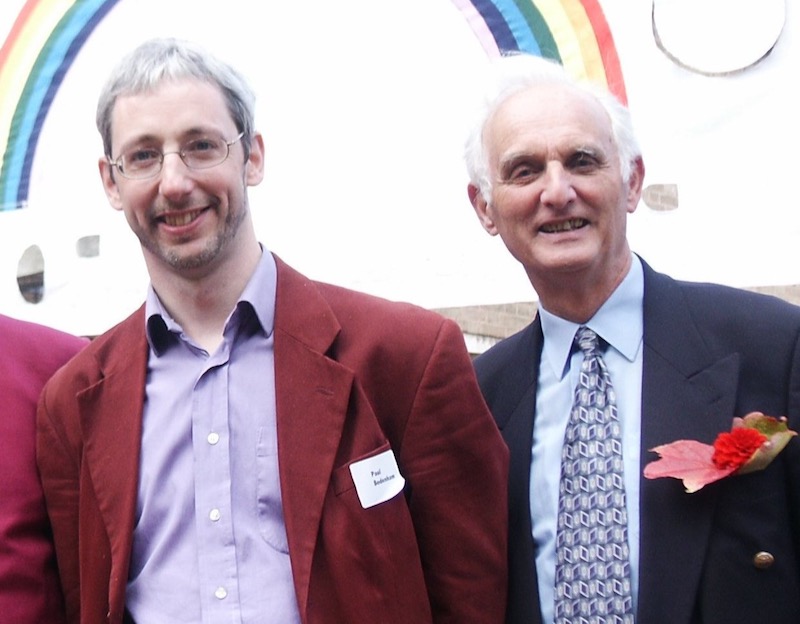The eminent meteorologist, climate change expert and Christian, Sir John Houghton, has died at the age of 88 of suspected Covid-19.
He has been described as a “towering figure” in the world of climate science. Among many achievements, he was co-chair of the Intergovernmental Panel on Climate Change’s (IPCC) scientific assessment working group and lead editor of the first three IPCC reports. In December 2007 he received the Nobel Peace Prize as part of the IPCC delegation, alongside the former vice-president of the United States of America, Al Gore. He was also professor in atmospheric physics at the University of Oxford and Chief Executive of the Met Office. He was once invited by Margaret Thatcher to brief the cabinet about Climate Change.
I would add to the many tributes paid to him by drawing attention to the use of his retirement to lobby on Climate Change. He gave his time and expertise generously to prompting the Churches to recognise the importance of the issue to humanity’s sustainable development.
The first time I heard him speak was at the October 2003 launch at the Methodist Central Hall in Coventry of Operation Noah, the Churches’ new ecumenical Climate Change campaign. Sir John was a patron of Operation Noah. His chart showing average global temperature variations over the last 10,000 years persuaded any doubters that the current rise was beyond normal variation and that Churches should engage with the issue. In his gentle and knowledgeable way, he highlighted countries in the global south which faced disaster over the rise of a warming and expanding ocean – for example Bangladesh, with 10 million people living on the coast below a one-metre above sea-level contour. He made startling predictions about an increase in disasters, such as typhoons strengthened by a warming ocean, and a huge rise in displaced people over coming decades. Sir John brought weight to the whole occasion, and later joined a ‘rainbow’ parade through Coventry, followed by a service at the city's Anglican Cathedral.
Earlier in 2003, his article in The Guardian, "Global warming is now a weapon of mass destruction", attracted international attention. It was a warning to leaders – particularly political – but to all leaders to work towards the stabilisation of greenhouse gases in the atmosphere at a sufficiently low level to stave off dangerous climate change.
In February 2004 he was a speaker at Belmont Abbey in Hereford at a conference on ‘Faith and the Environmental Imperative: Responding to the Call of Creation’, organised by the Newman Association and Christian Ecology Link, now Green Christian. He talked about Climate Change being a “sign of the times”. He said: “We are changing the CO2 content of the atmosphere very rapidly indeed. The changes are not occurring within a few thousand years (as in the Ice Ages) but within a hundred years – and that is very serious news for all of us.” He spoke about atmospheric changes having impacts on water, agriculture, migration, and human health and could envisage more conflict over resources. And he suggested that lacking the will to do anything about it is “actually a spiritual problem as well as any other sort of problem”. He felt, “we just do not take seriously enough our God-given responsibility to care for the Earth and to care for our fellow human beings, especially for those who are poor or disadvantaged”. At the end of his presentation, he held up a Celtic Cross “because it is the Cross of Jesus surrounded by the world”.
He was invited to speak on Climate Change at a Consultation on the Environment by the International Department of the Catholic Bishops Conference of England and Wales on 12 October 2004 in London. Eco-theologian Columban Sean McDonagh was the other keynote speaker, on Biodiversity, at a meeting convened by Archbishop Patrick Kelly of Liverpool. The small group of scientists, theologians and representatives of groups which had worked on the environment examined these two key issues and spoke about their work to take forward action on them. I remember the National Board of Catholic Women calling for a dedicated staff person on the environment at the Bishops’ Conference, and a Creation Sunday, both of which have come to pass more than a decade later. The National Justice and Peace Network took up the environment in its education work, stressing that creation care is an element in Catholic Social Teaching, and it set up an Environmental Working Group in October 2005. CAFOD spoke of its education and advocacy on Climate Change. Yet, the consultation had no follow up at the time by the Catholic bishops and, over tea afterwards, Sir John noted that the bishops were clearly cautious but he would be willing to be of further support, such as addressing the whole bishops’ conference direct and any training work. As far as I know these didn’t happen. The incentive given by Laudato Si’ came eleven years later.
As an evangelical Christian himself he put great effort into urging American evangelicals to understand that they could trust the IPCC and should reverse their policy of denying Climate Change. They did, and their statement, Climate Change: An Evangelical Call to Action, was produced in 2006. Sir John firmly believed that faith and science belonged together. He founded the John Ray Initiative, an organisation connecting environment, science and Christianity, in 1998. In one of their briefing papers in 2010, he challenged climate sceptics, saying that many of the voices of scepticism had been orchestrated by vested interests, especially in the United States, with the intent of discrediting and silencing the IPCC. He said there is no doubt that carbon dioxide has increased in the atmosphere over the last 200 years by about 40 per cent, largely due to the burning of coal, oil and gas by human society. And that carbon dioxide absorbs infrared radiation and acts like a blanket over the earth’s surface, increasing its average temperature. Sir John had extraordinary sensitivity to human destruction of God’s creation and compassion for the first victims – the poorest communities in the global south. But ultimately, he said many times that the instability of Climate Change was a terrible and looming legacy for future generations and that his advocacy work was prompted by concern for his own grandchildren.
In a moving tribute on Twitter, one of those grandchildren, Hannah Malcolm, said last week that, “my consistent memory will be his deep faith that he was doing work in service of the God he loved, and in service of the world he loved”. She reported that Sir John spent his final years living by the sea in his native Wales.
Paul Bodenham, Operation Noah founder, recalls: “John spent many hours, over many years, touring churches in Britain and the United States, making the case for Christians to act on Climate Change. It was a ministry in which he was quietly tenacious, and I was struck by the integrity with which he spoke, fully both a scientist and a disciple”.
Sir John said himself in 2013: “People say, ‘Let’s wait and see if it really happens.’ That’s not a good thing to do at all, because even if we turned off all carbon emissions tomorrow, the climate would continue to warm. We can’t turn the clocks back when we’ve found out we don’t like it; we really have to get on with it now. It’s very urgent.”
Ellen Teague is a member of the National Justice and Peace Network Environment Working Group and the Columban team for Justice, Peace and Ecology.



 Loading ...
Loading ...
What do you think?
You can post as a subscriber user ...
User comments (0)